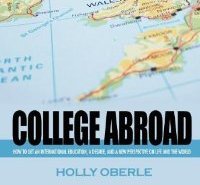 If study abroad is a wonderful experience wouldn’t an entire college degree earned abroad be even better? Holly Oberle’s book College Abroad: How to Get an International Education, a Degree, and a New Perspective on Life and the World, is a detailed guide on how to pursue the adventure of university studies and life outside your home country. It is not about participating in study abroad for a few weeks or a year, but instead focuses on students considering getting their complete bachelor’s, master’s, or doctor’s degree in a foreign country. The book is straightforward, and could be divided into two parts: first the strictly practical and second the philosophical and cultural aspects.
If study abroad is a wonderful experience wouldn’t an entire college degree earned abroad be even better? Holly Oberle’s book College Abroad: How to Get an International Education, a Degree, and a New Perspective on Life and the World, is a detailed guide on how to pursue the adventure of university studies and life outside your home country. It is not about participating in study abroad for a few weeks or a year, but instead focuses on students considering getting their complete bachelor’s, master’s, or doctor’s degree in a foreign country. The book is straightforward, and could be divided into two parts: first the strictly practical and second the philosophical and cultural aspects.
 The practical sections of the book focus on topics such as choosing an appropriate university, affording your degree abroad, applying, paperwork, packing, and settling in the first few days. Oberle goes into great detail and I’m sure that this would be of great help to anyone who wants to be thoroughly prepared. It would, however, have been useful to have checklists to keep track of things and make the book more reader friendly. And, unfortunately, since each country has its own way of doing things, the author often has to suggest that the reader “check and see how they do it the place where you will be studying.”
The practical sections of the book focus on topics such as choosing an appropriate university, affording your degree abroad, applying, paperwork, packing, and settling in the first few days. Oberle goes into great detail and I’m sure that this would be of great help to anyone who wants to be thoroughly prepared. It would, however, have been useful to have checklists to keep track of things and make the book more reader friendly. And, unfortunately, since each country has its own way of doing things, the author often has to suggest that the reader “check and see how they do it the place where you will be studying.”
The philosophical and cultural part of the book focuses on why you would go to college abroad, how to approach doubters among your family and friends, and cultural considerations. She gives some convincing rebukes for arguments that college abroad is too expensive, unsafe, or a bad choice for a number of different reasons. And her complaints about the faults of traditional study abroad (as an alternative to earning a complete degree in a foreign country) coincide with many of the weak spots that inspired our team at Melibee to work on the Better Abroad project. Plus Oberle advises on some of the complicated personal aspects to consider, such as a student’s ethnicity, sexual orientation, and religion, and how they will affect adaptation to a different culture.
The biggest hole in the book may be its text book style. It would be a more enjoyable read, more inspiring, and a better tool to convince students to take on the adventure of college abroad if it were more personal. I wish she had asked students who have gone through the experience to share their stories, what they learned, and their advice on how to truly enjoy the opportunity and grow. A few student profiles or first hand accounts would help readers vicariously experience the rewards of working up the courage to go abroad and working through the paperwork and red tape necessary to do it.
In spite of this weakness, it is an extremely helpful book for three main audiences. First, high school counselors could have it on hand as a resource for students looking for alternatives to a more traditional path to college. Second, colleges could make it available for students looking at masters programs abroad. Third, individuals who are are considering a degree abroad could of course use it to help them consider all the possibilities and details to keep in mind.
 About the Author: Maria Snyder teaches English as a Foreign Language in the northwestern Spain, where she has lived over the past ten years. She studied Politics as Whitman College. She loves working on cross cultural questions with Melibee, coordinating the blog and contributing to re-entry projects. Maria is the coordinator for the Green Passport Program, which focuses on making education abroad improve its environmental aspects.
About the Author: Maria Snyder teaches English as a Foreign Language in the northwestern Spain, where she has lived over the past ten years. She studied Politics as Whitman College. She loves working on cross cultural questions with Melibee, coordinating the blog and contributing to re-entry projects. Maria is the coordinator for the Green Passport Program, which focuses on making education abroad improve its environmental aspects.

